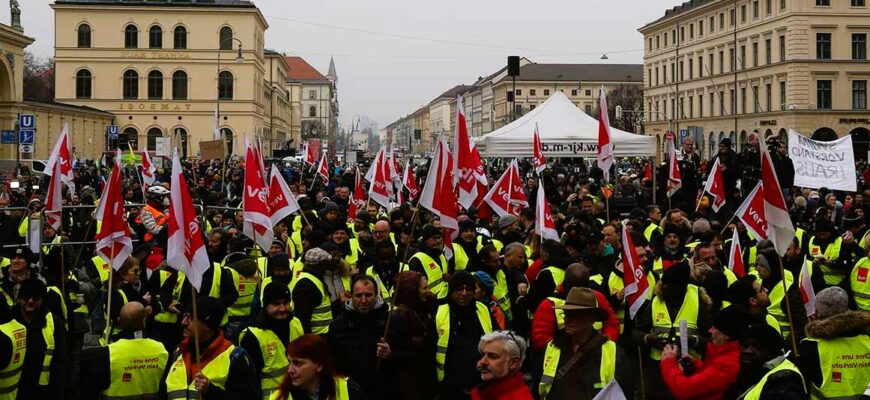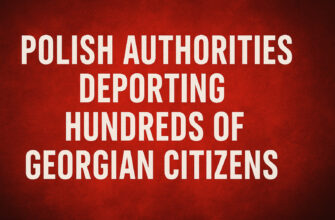Germany faced a wave of strikes in February 2025 that grabbed headlines and disrupted daily life for millions. From airports to healthcare facilities, workers across various sectors walked off the job, demanding better pay and working conditions. These events didn’t just affect travelers or patients—they sent ripples through the economy and sparked debates about labor rights in one of Europe’s biggest powerhouses. In this article, journalists from TheMors dive into what happened, why these strikes took place, and what they mean for Germany moving forward. Whether you’re planning a trip or just curious about global news, here’s everything you need to know about the strikes in Germany in February 2025.
What Sparked the Strikes in February 2025?
The strikes in Germany during February 2025 were driven by ongoing disputes between workers and employers over wages and job conditions. The Verdi trade union, which represents public sector employees, led the charge. They called for an 8% pay raise, higher bonuses, and extra days off for about 2.5 million workers. This wasn’t a small ask—government officials and employers quickly labeled it financially unfeasible, estimating it would cost an extra 15 billion euros annually.
The tension had been building for months. Inflation was eating into salaries, and workers felt their paychecks weren’t keeping up with rising costs. Add to that long hours and staffing shortages, and you’ve got a recipe for frustration. By February, negotiations had hit a wall. Verdi responded with what they call “warning strikes”—short, intense walkouts meant to pressure employers into compromise. But these weren’t just warnings; they shut down key services across the country.
Where Did the Strikes Hit Hardest?
Airports Grounded by Walkouts
One of the biggest impacts came at Germany’s airports. On February 27, 2025, ground staff and security workers at major hubs like Frankfurt, Munich, and Hamburg went on strike. The result? Hundreds of flights canceled, leaving travelers stranded. Frankfurt, the busiest airport in Germany, saw nearly all its scheduled takeoffs and landings wiped out for the day. Munich wasn’t far behind, with a “greatly reduced flight schedule” that left passengers scrambling.
The German Airport Association (ADV) estimated that over 510,000 travelers were affected by these airport strikes in late February alone. More than 3,400 flights were canceled, hitting airlines like Lufthansa hard. The timing couldn’t have been worse—February is a busy travel month with school holidays and business trips in full swing. Posts on X captured the chaos, with travelers sharing photos of empty check-in counters and packed train stations as people looked for other ways to get around.
Healthcare Under Pressure
It wasn’t just the skies that took a hit. On February 6, healthcare workers at over 200 facilities across Germany walked out. In cities like Berlin and Hamburg, around 20,000 employees joined the strike, rallying for better pay and overtime compensation. Emergency care stayed open, but routine appointments and non-urgent surgeries were postponed. Patients faced delays, and hospitals struggled to manage with skeleton crews.
This healthcare strike was part of the same Verdi push for a new contract. Workers argued that their wages hadn’t kept pace with the demands of the job—long shifts, emotional stress, and a shortage of staff. Local governments said they couldn’t afford the proposed raises, but for the workers, it was a matter of fairness.
Other Sectors Join In
The unrest spread beyond airports and hospitals. Kindergartens saw walkouts on February 7, leaving parents to find last-minute childcare. Waste collection services in cities like Berlin and Essen also stopped, with bins piling up for days. These smaller strikes showed how widespread the discontent was—it wasn’t just one group of workers; it was a movement across public services.
Why Were These Strikes Such a Big Deal?
Germany isn’t new to strikes—labor unions have a strong history here. But the scale and timing of the February 2025 walkouts made them stand out. The country’s economy was already shaky, having contracted for two years straight. Experts predicted stagnation at best for 2025, with manufacturing in a slump and households saving more than spending. Throwing mass strikes into the mix didn’t help.
For businesses, the airport disruptions were a nightmare. Hotels, restaurants, and retailers lost money as travelers canceled plans. The ADV warned that the economic fallout could linger, especially if strikes kept happening. And they did—more walkouts followed in March, suggesting February was just the start.
On the flip side, the strikes put a spotlight on worker rights. Verdi’s demands weren’t unreasonable to many. Inflation had hit hard, and public sector jobs often pay less than private ones. Social media buzzed with support for the strikers, with some calling it a “wake-up call” for employers. Others, though, grumbled about the inconvenience, especially those stuck at airports or waiting for medical care.
How Did Germany Respond?
The government and employers didn’t budge much in February. After a second round of pay talks failed, Verdi ramped up the pressure with more strikes. Federal and municipal officials stuck to their line: an 8% raise was too expensive. They offered smaller increases, but the union wasn’t having it. By the end of the month, no deal was in sight.
Airports and hospitals tried to manage the chaos. Frankfurt urged passengers not to come to the terminal during strike days, while Berlin Brandenburg canceled all flights preemptively. Healthcare facilities leaned on emergency staff, but it wasn’t enough to avoid delays. The public’s patience was tested—some sympathized with the workers, others just wanted their flights back.
What Did February’s Strikes Mean for the Future?
The February strikes set the stage for more unrest. By early March, airport workers were at it again, canceling over 1,000 flights on March 10 alone. Verdi hinted at further action in government and municipal facilities, showing they weren’t backing down. This escalation worried analysts—could Germany handle more disruptions in an already fragile economy?
For travelers, it was a lesson in planning. February showed that strikes could hit hard and fast, especially in a country known for its efficiency. Checking flight statuses and having backup plans became must-dos. For workers, it was a test of resolve—would their demands be met, or would they have to settle?
The bigger picture is about balance. Germany’s labor market was under strain, with unemployment creeping up in February, though less than expected, according to the Federal Labour Office. The strikes highlighted a clash between worker needs and budget limits. How that gets resolved could shape the country’s economic path for years.
Tips for Navigating Strikes in Germany
If you’re traveling to or living in Germany, here’s how to stay ahead of strikes:
- Check News Updates: Sites like TheMors keep you posted on strike schedules and impacts.
- Monitor Flights: Use airline apps or airport websites for real-time cancellation info.
- Plan Alternatives: Trains and buses often run during airport strikes—book early.
- Stay Flexible: Have a backup if your plans involve public services like healthcare or transport.
These steps can save you headaches, especially with more strikes looming.
Looking Back at February 2025
The strikes in Germany in February 2025 weren’t just about missed flights or delayed appointments—they were a snapshot of a country wrestling with change. Workers wanted fair pay, employers wanted fiscal restraint, and everyone else got caught in the middle. TheMors journalists tracked these events to bring you the full story, from the picket lines to the economic fallout.
What’s clear is that February was a turning point. It showed the power of collective action and the cost of inaction. Whether you’re a traveler, a business owner, or just someone following the news, these strikes matter. They’re a reminder that even in a place as organized as Germany, things can grind to a halt when people demand to be heard.
Want to stay updated on this story and others like it? Visit TheMors – Breaking News for the latest insights and reports from around the globe.









